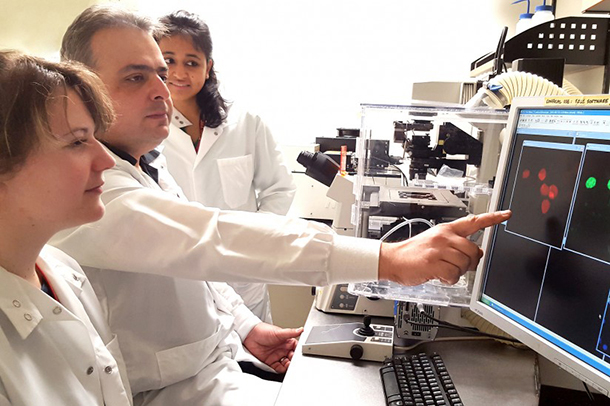Investigators at Keck Medicine of USC are tackling immune-mediated diseases in a whole new way with the creation of a joint postdoctoral program.
Omid Akbari, PhD, a professor in the Department of Molecular Microbiology and Immunology at the Keck School of Medicine of USC, said a combined postdoctoral effort with Janssen Research & Development, a unit of Johnson & Johnson, will give his lab’s researchers the ability to practice translational research that could flow from bench to bedside.
“Many times, scientists at academic institutions discover a novel pathway but are unable to follow the research to the clinical trial and drug development stage,” said Akbari, a principal investigator of the new Janssen Immunology Postdoctoral Program. “This program is formed with that aim in mind. Universities such as USC are centers of innovation that provide academic freedom not always found in industry. On the other hand, USC researchers will get access to an enormous wealth of technique, protocols, experiment design and clinical trial pipeline available at a large pharmaceutical such as Janssen.”
USC has a three-year contract with Janssen. During that time, USC will own 50 percent of any intellectual property that results from the collaborative postdoctoral program, Akbari said.
“It is very uncommon for a company to give intellectual property rights away,” Akbari said. “Right now, industry usually pays universities to conduct experiments. They get the results and have 100 percent of the IP rights. Universities get the fame, while industry gets the gold. This is a novel approach to finding solutions for patients’ maladies.”
Gavin Lewis, PhD, was named postdoctoral fellow of the program. Lewis spends about 80 percent of his time at Janssen Research & Development in San Diego and the rest at USC. During his three-year program, Lewis will examine innate lymphoid cells (ILCs), a novel cell type with important functions in human immune responses to infectious microorganisms.
“There are different flavors of ILCs that exacerbate disease,” Gavin said. “ILCs are also associated with many autoimmune and autoinflammatory diseases. We are trying to lock up the molecular level of that response, see if they actually cause disease and pinpoint if ILCs could be a new therapeutic target.”
— Zen Vuong


